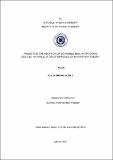DSpace Repository
PREDICTING THE ADOPTION OF WEARABLE HEALTH TRACKING DEVICES: AN APPLICATION OF DIFFUSION OF INNOVATION THEORY
JavaScript is disabled for your browser. Some features of this site may not work without it.
| dc.contributor.author | Şehbenderoğlu, Ziya
|
|
| dc.date.accessioned | 2020-01-10T07:55:52Z | |
| dc.date.available | 2020-01-10T07:55:52Z | |
| dc.date.issued | 2019-03 | |
| dc.identifier.uri | http://hdl.handle.net/11547/5288 | |
| dc.description.abstract | Bu çalışmada, Türkiye pazarındaki müşterilerin giyilebilir teknolojiyi kullanma ve benimseme konusundaki algılarını analiz etmek amacıyla Everett Rogers‘ın inovasyon yayınım modelini uygulanmıştır. Likert tipi, online tasarlanmış bir anket yoluyla 210 gönüllünün cevapları alınmıştır. Veriler, SPSS sürüm 24 ve AMOS sürüm 23 ile doğrulayıcı faktör analizi (CFA) ve yapısal eşitlik modellemesi (SEM) ile analiz edilmiştir. Temel olarak beş hipotez incelenmiştir. Bağımlı değişken (benimseme) ile diğer dört bağımsız değişken (izafi fayda, uyum, denenebilirlik ve gözlemlenebilirlik) arasında pozitif bir ilişkinin varlığı kabul edilmiştir. Ancak, sadece bir değişkenin (karmaşıklık) benimsemeye olumsuz etkisi olduğu düşünülmektedir . Bu araştırma, giyilebilir sağlık izleme cihazlarının benimsenmesinin seçilen pazarda bir trend haline gelip gelmeyeceğini öngörmeye yönelik bir denemedir. Diğer taraftan, sonuçlar önceki çalışmalarla karşılaştırıldığında şaşırtıcı ve ilginçti. İki hipotezin kabul edildiği ve diğerlerinin reddedildiğini gösteren araştırma, benimseme üzerinde uyum ve karmaşıklığın etkisini göstermiştir. Uyumun benimseme üzerinde olumlu etkisi olduğu onaylanmıştır ve bu da giyilebilir sağlık izleme cihazlarının (HTD) yaşam tarzı, inanç ve değerlerle uyumlu olmasının önemini yansıtmaktadır. Bu arada, benimseme üzerinde karmaşıklığın olumsuz bir etkiye sahip olduğu görüşü de desteklenmiştir. Bir başka deyişle sadelik, Türkiye pazarında giyilebilir cihazların kullanımı hassas ve kritik bir nokta olarak görülmektedir. Reddedilen faktörler ise izafi fayda, denenebilirlik ve gözlemlenebilirlikti. Sonuçların anlaşılması için çalışılan pazarın, örneğin Türkiye pazarının göz önünde bulundurulması ve giyilebilir sağlık izleme cihazlarının hala genç kabul edildiğinin bilinmesi gerçekten çok önemlidir . Bu nedenle, müşteriler bunu denemek bile istemeyebilir. Buna ek olarak faydalar hedef kitle açısından yeterince açık olmayabilir ve bu faydalar bazı nedenlerden dolayı anlaşılamayabilir. Bu nedenle, kullanıcının bu tür cihazları benimsemeyerek elde edeceği avantajların anlatılması çok önemlidir . | tr_TR |
| dc.language.iso | en | tr_TR |
| dc.publisher | ISTANBUL AYDIN UNIVERSITY INSTITUTE OF SOCIAL SCIENCES | tr_TR |
| dc.subject | Nesnelerin İnterneti | tr_TR |
| dc.subject | Giyilebilir ürünler | tr_TR |
| dc.subject | Teknolojinin benimsenmesi | tr_TR |
| dc.subject | Tüketici davranışı | tr_TR |
| dc.subject | Sağlık ve fitness | tr_TR |
| dc.subject | Sağlık izleme cihazları | tr_TR |
| dc.subject | Internet of Things | tr_TR |
| dc.subject | Wearables | tr_TR |
| dc.subject | Technology adoption | tr_TR |
| dc.subject | Consumer behavior | tr_TR |
| dc.subject | Health and fitness | tr_TR |
| dc.subject | Health tracking devices | tr_TR |
| dc.title | PREDICTING THE ADOPTION OF WEARABLE HEALTH TRACKING DEVICES: AN APPLICATION OF DIFFUSION OF INNOVATION THEORY | tr_TR |
| dc.type | Thesis | tr_TR |
| dc.description.abstractol | This study applied Everett Rogers‘ innovation diffusion model to analyze the perceptions of customers in Turkish market toward using and adopting wearable technology. 210 voluntarily responses were collected via Likert type online designed questionnaire. Data were analyzed by SPSS version 24 and AMOS version 23, through confirmatory factor analysis (CFA) and structural equation model (SEM). Basically, five hypotheses were investigated. It is assumed there are positive relationships between the dependent variable (The Adoption) and the other four independent variables (Relative advantage, Compatibility, Trialability and Observability). However, just one of the independent variable (Complexity) considered having a negative relationship with the Adoption. This study is a try to foresee whether the adoption of wearable health tracking devices is going to become a trend in the chosen market. Moreover, the finding was surprising and interesting comparing with previous studies. Where it revealed acceptance for two hypotheses and rejecting the rest, the supported factors were compatibility and complexity‘s impact on adoption. Compatibility was confirmed to have a positive effect over the adoption, which reflects the importance of wearable health tracking devices (HTD) to be compatible with lifestyle, beliefs and values to Turkish market. Meanwhile, complexity was supported by having a negative effect on the adoption. In other words, simplicity is considered by Turkish market as a sensitive and critical point in term of use of wearables. In this study, the rejected factors are Relative advantage, Trialability and Observability. It is really essential for the results , to be understood while considering the market that has been studied, for example, wearable HTD in Turkish market is still considered young. Therefore, customers might not even think of trying it. Add to that, the benefits might not be clear enough to the target customers or they are not able to see and understand those benefits for some reasons, thus, it is very critical to explain the advantages that are the user is going to gain by adopting such devices. | tr_TR |
| dc.publisher.firstpagenumber | 1 | tr_TR |
| dc.publisher.lastpagenumber | 68 | tr_TR |
| dc.identifier.bibliographictag | Şehbenderoğlu, Ziya, PREDICTING THE ADOPTION OF WEARABLE HEALTH TRACKING DEVICES: AN APPLICATION OF DIFFUSION OF INNOVATION THEORY(2019), ISTANBUL AYDIN UNIVERSITY INSTITUTE OF SOCIAL SCIENCES | tr_TR |
Files in this item
This item appears in the following Collection(s)
-
Tezler -- Thesis [3470]
